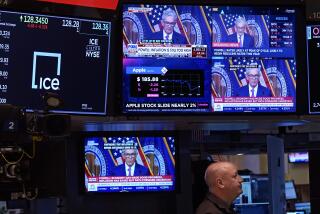401(k) Balances Stable in 1999-2000
- Share via
The average investor who had a 401(k) account in both 1999 and 2000 saw his or her balance hold steady last year, as contributions from workers offset the stock market drop, according to a study released Monday. The findings indicate that earlier reports of a double-digit decline in 401(k) balances may have been overblown.
Among the 8.3 million individuals studied who held 401(k)s both years, the average account balance was off 0.1% to $58,774 in December from $58,850 a year earlier, according to the Washington-based Employee Benefit Research Institute and the Investment Co. Institute.
The trends varied greatly by age group, however, as the average balances of older investors sank, while those of younger investors rose sharply.
Recent studies showing a 12% overall drop in the average 401(k) balance last year were skewed, the EBRI and ICI contend. The earlier studies were simply snapshots of how 401(k) balances changed last year, and were unduly affected by new participants entering plans and by those exiting plans, researchers said.
“You hear a lot about ‘statement shock,’ but that’s a little misleading,” said Dallas Salisbury, president of the EBRI. “There are notable exceptions, of course, but most 401(k) [accounts] have hung in there fairly well.”
Overall, new investment contributions offset the stock market’s plunge last year, he said.
“The other thing is, 401(k) participants tend to be broadly diversified, so they didn’t get hurt as badly as you might think,” Salisbury said. “The Nasdaq composite index lost 39% last year, but few if any 401(k) savers had all their money in the Nasdaq.”
About 70% of 401(k) plan assets are in stocks, Salisbury said, but holdings tend to be in diversified funds rather than in highly aggressive funds. And one in four savers has no stock exposure.
Although 2000 produced little change in the average balance of consistent plan participants, the results varied widely by age, said John Rea, the ICI’s chief economist.
The average account balance of participants in their 20s who held accounts in 1999 and 2000 surged about 27%. But for participants in their 60s, the average balance fell nearly 6%.
Contributions by younger participants usually are of greater importance in percentage terms because account balances of younger workers tend to be relatively small.
In contrast, investment return is of greater importance for older participants because their balances tend to be large relative to their annual contributions.
(BEGIN TEXT OF INFOBOX / INFOGRAPHIC)
401(k) Trends: Age Matters
Among 401(k) participants who held accounts in both 1999 and 2000, balances overall remained almost unchanged last year, according to a new study. But older investors fared markedly worse than younger investors.
*--*
Participant Avg. year-end account balance:
age group 1999 2000 % change
20s $8,219 $10,431 +26.9%
30s 31,518 33,125 +5.1
40s 62,059 62,694 +1.0
50s 98,139 95,836 --2.3
60s 122,240 115,206 --5.8
Total $58,850 $58,774 --0.1
Sources: Employee Benefit Research Institute, Investment Company Institute
*--*
More to Read
Inside the business of entertainment
The Wide Shot brings you news, analysis and insights on everything from streaming wars to production — and what it all means for the future.
You may occasionally receive promotional content from the Los Angeles Times.










